UNWTO and European Commission address the significance of the Tourism Satellite Accounts to measure the economic impact of the sector in Europe
The World Tourism Organization (UNWTO) and the Directorate-General for Internal Market, Industry, Entrepreneurship and SMEs (DG GROW) of the European Commission gathered national tourism policy makers and statisticians in Brussels to advance in the implementation of the measurement of the economic impact through Tourism Satellite Accounts.
As part of the events connected to the 2017 International Year of Sustainable Tourism for Development, and within the framework of the cooperation between UNWTO and DG GROW, the two institutions co-organized the Workshop "Measuring the economic impact of tourism in Europe: the Tourism Satellite Account (TSA)", in collaboration with Eurostat. The event, hosted by DG GROW, was held in Brussels, Belgium on 29-30 November, 2017.
Bringing together over 100 policy makers (data users) and tourism statisticians and TSA compilers (data producers) from EU Member States and COSME [1] countries, the Workshop helped to bridge better understanding and entice collaboration amongst these key stakeholders.
"The economic importance of tourism in the European Union is increasingly recognized and better understood, partly thanks to the development of TSA in some EU Member States. It is important to create cohesion around this theme and we hope that the EU becomes an example in this regard to guide the rest of the regions," said UNWTO Secretary-General Taleb Rifai.
A sense of optimism for tourism measurement and TSA in Europe emerged, alongside the realization that TSA is beyond a technical exercise, very much a strategic endeavor for the tourism sector.
The workshop was conducted with expertise from the European Commission (including Eurostat), UNWTO, UN Statistics Division (UNSD), Statistics Austria, the National Statistical Office of the Czech Republic, Destination Canada and Statistics Malaysia.
The topics debated ranged from technical inputs to governance issues and political leadership, all elements necessary for a successful TSA implementation. The participants exchanged ideas on the current status of the different national TSAs, their specificities and how to build the capacities and enabling environments for furthering their development. A key conclusion was that the challenges of TSA development in Europe have less to do with technical expertise and more with resource, communication, and political engagement.
The discussions have also emphasized the need to improve timeliness, while maintaining credibility, and fostering partnerships and dialogue between data producers and users. Reliable aggregated TSA estimates are key for strong tourism policy making which aims to support a sustainable and resilient tourism sector.
TSA is an instrument to measure and monitor the economic impact of tourism and links data on tourism to the broader economy. It is an accounting framework enabling the measurement and international comparison of the contribution of tourism to job creation, economic growth and the generation of wealth.
About UN Tourism
The World Tourism Organization (UN Tourism) is the United Nations agency responsible for the promotion of responsible, sustainable and universally accessible tourism.
As the leading international organization in the field of tourism, UN Tourism promotes tourism as a driver of economic growth, inclusive development and environmental sustainability and offers leadership and support to the sector in advancing knowledge and tourism policies worldwide.
Our Priorities
Mainstreaming tourism in the global agenda: Advocating the value of tourism as a driver of socio-economic growth and development, its inclusion as a priority in national and international policies and the need to create a level playing field for the sector to develop and prosper.
Promoting sustainable tourism development: Supporting sustainable tourism policies and practices: policies which make optimal use of environmental resources, respect the socio-cultural authenticity of host communities and provide socio-economic benefits for all.
Fostering knowledge, education and capacity building: Supporting countries to assess and address their needs in education and training, as well as providing networks for knowledge creation and exchange.
Improving tourism competitiveness: Improving UN Tourism Members' competitiveness through knowledge creation and exchange, human resources development and the promotion of excellence in areas such as policy planning, statistics and market trends, sustainable tourism development, marketing and promotion, product development and risk and crisis management.
Advancing tourism's contribution to poverty reduction and development: Maximizing the contribution of tourism to poverty reduction and achieving the SDGs by making tourism work as a tool for development and promoting the inclusion of tourism in the development agenda.
Building partnerships: Engaging with the private sector, regional and local tourism organizations, academia and research institutions, civil society and the UN system to build a more sustainable, responsible and competitive tourism sector.
Our Structure
Members: An intergovernmental organization, UN Tourism has 160 Member States, 6 Associate Members, 2 Observers and over 500 Affiliate Members.
Organs: The General Assembly is the supreme organ of the Organization. The Executive Council take all measures, in consultation with the Secretary-General, for the implementation of the decisions and recommendations of the General Assembly and reports to the Assembly.
Secretariat: UN Tourism headquarters are based in Madrid, Spain. The Secretariat is led by the Secretary-General and organized into departments covering issues such as sustainability, education, tourism trends and marketing, sustainable development, statistics and the Tourism Satellite Account (TSA), destination management, ethics and risk and crisis management. The Technical Cooperation and Silk Road Department carries out development projects in over 100 countries worldwide, while the Regional Departments for Africa, the Americas, Asia and the Pacific, Europe and the Middle East serve as the link between UN Tourism and its 160 Member States. The Affiliate Members Department represents UN Tourism's 500 plus Affiliate members.
Rut Gómez Sobrino
Principal Media Officer
(+34) 91 567 81 60
UN Tourism
